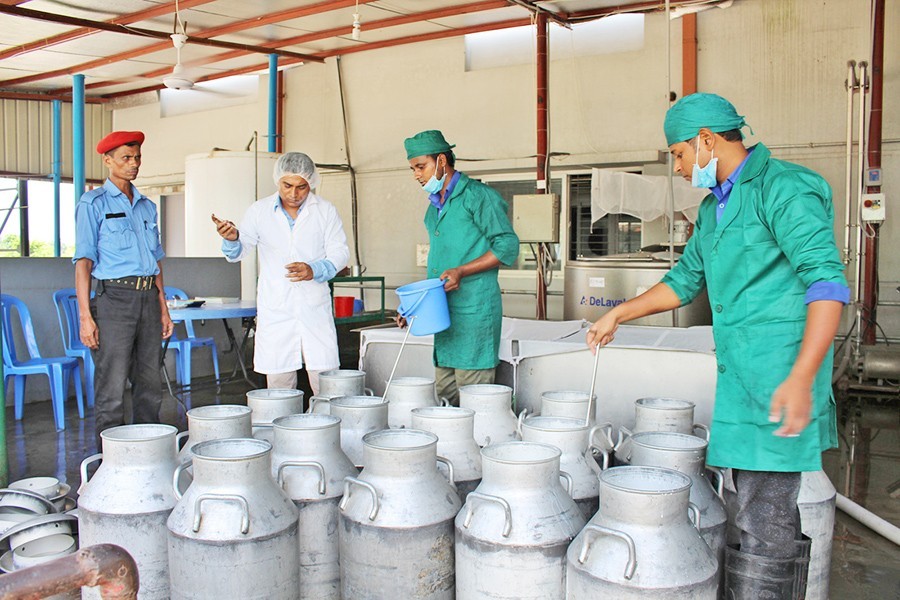Newspaper reports indicate that increasing number of students are now enrolling in technical schools with an eye on developing skills. There is perhaps little doubt that this is happening in the wake of the growing demand of trade and commerce. There are employment opportunities, so argue the employers, but there exists shortage of skilled manpower that they need. Bangladeshis working abroad are mostly engaged in low-productivity jobs fetching meagre income. By and large, the sad situation prevailing in the job market invokes the importance of skilled human resource.
This write-up is a case study on how training could help enhance income of livestock rearers drawing upon a research done by Jonathan Argent, Britta Augsburg, Imran Rasul on "Livestock Asset Transfers With and Without Training: Evidence from Rwanda".
Rwanda's Girinka (`One Cow per Poor Family') programme has distributed more than 130,000 livestock asset transfers in the form of cows to the rural poor since 2006. Supply side constraints resulted in complementary training for some beneficiaries but not for others - a situation of 'haves' and 'have-nots'. The researchers exploited these differences to estimate the additional impact of receiving complementary training with the cow transfer, on household's economic outcomes up to six years after having received the livestock asset transfer. "As farmers themselves do not self-select to receive training, but rather the provision of training is driven by supply/capacity constraints faced by NGOs, the assignment of training is plausibly exogenous to other factors that drive outcomes related to milk production, livestock productivity, household earnings and assets, as measured up to six years after the initial livestock asset transfer", say the researchers.
The results of the research show that even in a setting where linkages between farmers and markets remain weak, the provision of training with asset transfers still have economically significant impacts on household's milk production, livestock productivity, earnings and asset accumulation. This training is found to be far more effective for the outcomes of interest than the availability of subsequent training from local government vets, or the provisions of small amounts of capital inputs provided with livestock asset transfers. The rate of return to the provision of training is high and likely larger than for other investments available to beneficiary households: even a conservative estimate suggests training costs would be recovered and the programme break even if the training allows households to obtain higher milk yields for three additional months of the year. As a point of comparison we note that in ideal circumstances, cows usually produce milk for 10 months after calving. Moving forward, the findings suggest the crucial complementarily between asset transfers and training provision, the impacts of which persist over time, and for many outcomes, the impacts are self-perpetuating and increase in magnitude over time.
The major findings, albeit paraphrased, are presented here. First, households that received training with their cows are 56 per cent more likely to be producing milk in 2012, and on average produce 1.5 liters more milk per day. This corresponds to a 162 per cent increase in milk production over households that received no training. This increased production stems largely from increased milk yields obtained holding constant the stock of cows, rather than increased holdings of cows per se. Second, the increased production and sales of milk translate into significantly higher households' earnings: households with training experience a six fold increase in earnings from milk sales as compared to the average earnings of households that did not receive training. Moreover, the other key income gain for trained households comes through sales of animals. These income gains dwarf the monetary cost of the training supplied per farmer, generating rates of return far in excess of those that are likely to be available through other investments. Finally, the increased earnings of households with training experience translate into greater asset accumulation.
Overall, it has been found that farmer' skill related to animal husbandry matters. Attempts to improve these types of human capital are likely to yield high mean returns, as well as reducing income volatility as households are more able to rely on stable income streams from the sales of livestock produce such as milk. These types of human capital investments, for those that have long exited the formal schooling system, are an important form of anti-poverty measure.
The researchers suggest that future work should certainly be based "on randomised control trials, should investigate the optimal design of training to bundle with asset transfers. This will become increasingly important as such programmes are rolled out to different populations that vary in their links to markets, pre-existing levels of knowledge of livestock rearing, and availability of alternative sources of training such as government and private sector vets".
Bangladesh has a livestock population of about 30 million. Many of the poor and marginal households, especially women members of such households, eke out a living from selling milk. Unfortunately, mulching cows here are not as productive as in the Netherlands or New Zealand owing mostly to the lack of grazing land for fodder and the skill to get the milk. We can possibly propose that livestock rearers should be trained on how to take care of their livestock and maximise mulching from a unit of livestock. It needs no mention that like the fisheries sub-sector, the livestock sub-sector products are going to be heavily in demand in the face of rising per capita income. Current domestic production of 5.2 million litres of milk needs to be raised substantially so that more income goes to the livestock farmers who are generally poor women.
Abdul Bayes is a Professor of Economics at Jahangirnagar University.


